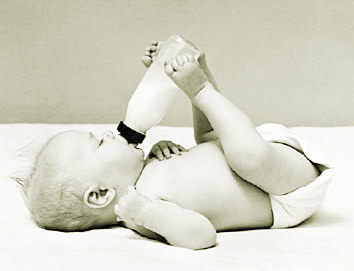Drinking more than three glasses of milk a day may not protect bones against breaking - and may even lead to higher rates of death, say researchers. A new study suggests certain types of sugars found in milk may increase inflammation and oxidative stress, which can damage body cells. But Swedish researchers said their study could not prove ‘cause and effect’ and much more research was needed before anyone would be advised to limit their milk consumption.
调研者称,每天喝三杯以上牛奶非但不会帮你预防骨折,还可能导致更高的致死率。一项最新的研究表明,牛奶中包含的特定糖类会增加炎症和氧化压力,损坏身体细胞组织。然而在确定这一调查结果之前,瑞典调查者认为还需要进行更多的调查。

Milk is recommended for cutting the risk of fractures because it contains calcium and vitamin D, which are vital for bone strength. However, there have been conflicting results from studies into the health benefits of milk in recent decades, with some showing it prevents heart attacks and strokes and others the opposite. Professor Karl Michaëlsson, Sweden, led a team to investigate whether the mechanism for potential harm was consumption of the sugars lactose and galactose found in high levels in milk, compared with much lower levels in other dairy products.
牛奶因其还有钙质和维生素D、可以预防骨折而被推荐饮用。然而近年来,牛奶的功效一直备受争议。有人认为牛奶可以预防心脏病和中风,而又有人对此持反对意见。瑞典乌普萨拉大学卡尔教授带领一个小组调查的内容就是:和其他乳制品相比,牛奶中乳糖和半乳糖含量较高,而这是否会对人体造成潜在危害。
Two large groups of 61,433 women and 45,339 men in Sweden completed food frequency questionnaires for 96 common foods including milk, yoghurt and cheese. Women were tracked for an average of 20 years, during which time 15,541 died and 17,252 had a fracture, of whom 4,259 had a hip fracture. In women, drinking more milk did not cut the risk of broken bones, says the study published in The BMJ. Men were tracked for an average of 11 years, during which time 10,112 died and 5,066 had a fracture, with 1,166 hip fracture cases. Men who drank more milk also had a higher risk of death, although much lower than in women.In contrast, eating more dairy products such as yoghurt and cheese - with a low lactose content – led to lower death rates and fewer fractures, particularly in women.
瑞典,共有61433名女性和45339名男性接受了关于摄入牛奶、优格和乳酪频率的问卷调查。关于女性的追踪调查历时20年,期间15541名女性过世,17252名女性曾骨折,其中4259名女性髋骨骨折。饮用牛奶并没有降低女性骨折的风险。而男性的调查则持续了11年,期间10112名男性过世,5066名男性骨折,其中1166名髋骨骨折。饮用更多牛奶的男性死亡率虽与女性相比较低,但仍旧高于牛奶摄入少的人群。相反,摄入乳糖含量较低的优格或乳酪之类的乳制品死亡率更低,而且骨折风险更小。
Prof Sue, Head of the Department of Nutritional Sciences, University of Surrey, said the study had limitations, such as weak methods to assess lifestyle habits including bodyweight. She said: ‘Also key is that all milk in Sweden is fortified with vitamin A. This may well be an important confounding factor. Milk and dairy products in the UK provide 50-60 percent of the calcium in our diet. We know that low calcium intakes is a risk factor for osteoporosis.’
萨里大学营养科学系主任苏教授认为这些调研都有其局限性,并不能准确地评估包括体重等生活习惯。她说,“瑞典的牛奶中有加强补充维生素A,这可能也是关键因素之一。英国的牛奶和乳制品提供了日常营养摄入中50%~60%的钙质。而我们知道,低钙摄入会导致骨质疏松。”
Prof Brian Ratcliffe, Professor of Nutrition, Robert Gordon University, Aberdeen, said the possible role of alcohol intake was understated given that most of the extra deaths in milk drinkers were from heart disease. Lowest milk consumption was associated with the highest consumption of alcohol, and ‘there is considerable evidence for a cardio-protective effect of alcohol at modest intakes’ he said.
罗伯特戈登大学营养学布莱恩·雷德克里夫教授认为,酒精摄入也应划入考虑范围内,因为研究中很多牛奶饮用者死于心脏疾病。低牛奶摄入和高酒精摄入是分不开的,而且“有可观的证据表明,适量饮酒会保护心脏”。













